Related Research Articles

Giacomo Puccini was an Italian composer known primarily for his operas. Regarded as the greatest and most successful proponent of Italian opera after Verdi, he was descended from a long line of composers, stemming to the late-Baroque era. Though his early work was firmly rooted in traditional late-19th-century Romantic Italian opera he later developed his work in the realistic verismo style, of which he became one of the leading exponents.
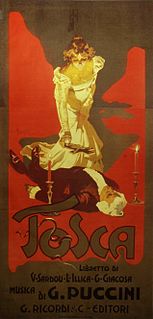
Tosca is an opera in three acts by Giacomo Puccini to an Italian libretto by Luigi Illica and Giuseppe Giacosa. It premiered at the Teatro Costanzi in Rome on 14 January 1900. The work, based on Victorien Sardou's 1887 French-language dramatic play, La Tosca, is a melodramatic piece set in Rome in June 1800, with the Kingdom of Naples's control of Rome threatened by Napoleon's invasion of Italy. It contains depictions of torture, murder, and suicide, as well as some of Puccini's best-known lyrical arias.
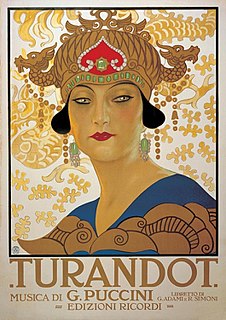
Turandot is an opera in three acts by Giacomo Puccini, posthumously completed by Franco Alfano in 1926, and set to a libretto in Italian by Giuseppe Adami and Renato Simoni. Its best-known aria is "Nessun dorma".

La Tosca is a five-act drama by the 19th-century French playwright Victorien Sardou. It was first performed on 24 November 1887 at the Théâtre de la Porte Saint-Martin in Paris, with Sarah Bernhardt in the title role. Despite negative reviews from the Paris critics at the opening night, it became one of Sardou's most successful plays and was toured by Bernhardt throughout the world in the years following its premiere. The play itself had dropped from the standard theatrical repertoire by the mid-1920s, but its operatic adaptation, Giacomo Puccini's Tosca, has achieved enduring popularity. There have been several other adaptations of the play including two for the Japanese theatre and an English burlesque, Tra-La-La Tosca as well as several film versions.

In opera, verismo was a post-Romantic operatic tradition associated with Italian composers such as Pietro Mascagni, Ruggero Leoncavallo, Umberto Giordano, Francesco Cilea and Giacomo Puccini. Verismo as an operatic genre had its origins in an Italian literary movement of the same name. This was in turn related to the international literary movement of naturalism as practised by Émile Zola and others. Like naturalism, the verismo literary movement sought to portray the world with greater realism. In so doing, Italian verismo authors such as Giovanni Verga wrote about subject matter, such as the lives of the poor, that had not generally been seen as a fit subject for literature.

Renata Tebaldi was an Italian lirico-spinto soprano popular in the post-war period and was especially prominent as one of the stars of La Scala and the Metropolitan Opera. Among the greatest and most beloved opera singers, she has been said to have possessed one of the most beautiful voices of the 20th century, a voice that was focused primarily on the verismo roles of the lyric and dramatic repertoires. Italian conductor Arturo Toscanini praised Tebaldi's voice as "la voce d'angelo", while La Scala music director Riccardo Muti summed up Tebaldi as "one of the greatest performers with one of the most extraordinary voices in the field of opera."

La fanciulla del West is an opera in three acts by Giacomo Puccini to an Italian libretto by Guelfo Civinini and Carlo Zangarini, based on the 1905 play The Girl of the Golden West by the American author David Belasco. Fanciulla followed Madama Butterfly, which was also based on a Belasco play. The opera has fewer of the show-stopping highlights that characterize Puccini's other works, but is admired for its impressive orchestration and for a score that is more melodically integrated than is typical of his previous work. Fanciulla displays influences from composers Claude Debussy and Richard Strauss, without being in any way imitative. Similarities between the libretto and the work of Richard Wagner have also been found, though some attribute this more to the original plot of the play, and have asserted that the opera remains quintessentially Italian.

The Festival Puccini is an annual summer opera festival held in July and August to present the operas of the famous Italian composer Giacomo Puccini.
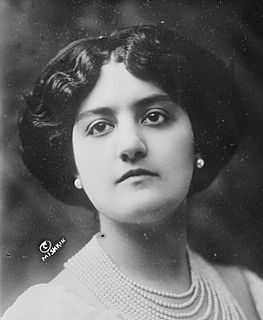
Carmen Melis was an Italian operatic soprano who had a major international career during the first four decades of the 20th century. She was known, above all, as a verismo soprano, and was one of the most interesting singing actresses of the early 20th century. She made her debut in Novara in 1905 and her career rapidly developed in her native country over the next four years. From 1909 to 1916 she performed with important opera companies in the United States; after which she was busy performing at many of Europe's most important opera houses. From 1917 until her retirement from the stage in 1935 she was particularly active at the Teatro Costanzi in Rome and at La Scala in Milan. After her singing career ended, she embarked on a second career as a voice teacher. Her most notable student was soprano Renata Tebaldi.

Nicola Luisotti is an Italian conductor. He currently holds the title "Director Principal Invitado" of Madrid's Teatro Real.
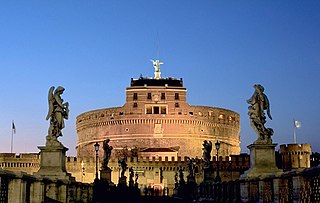
"E lucevan le stelle" is a romantic aria from the third act of Giacomo Puccini's opera Tosca from 1900, composed to an Italian libretto by Luigi Illica and Giuseppe Giacosa. It is sung in act 3 by Mario Cavaradossi (tenor), a painter in love with the singer Tosca, while he waits for his execution on the roof of Castel Sant'Angelo.
Anda-Louise Bogza is a celebrated Romanian opera soprano. In 1994, she won both the First Prize and the Audience Prize at the Vienna International Singing Competition. In 2007, she was honored with the Thalia Award.
Donnie Ray Albert is an American operatic baritone who has had an active international career since 1976.
Anthony Laciura is an American actor and operatic tenor. Laciura is often noted for his abilities as a comprimario, and actor. Born in New Orleans, he studied voice there with Charles Paddock, also the teacher of Ticho Parly. He is also well known for playing Eddie Kessler in Boardwalk Empire (2010-13).
Giordano Bellincampi is an Italian-born Danish conductor and trombonist. He is the Music Director of the Auckland Philharmonia Orchestra. Previous position have included General Music Director of the Duisburg Philharmonic, Chief Conductor of the Kristiansand Symphony Orchestra, General Music Director of the Danish National Opera in Aarhus and chief conductor of the Copenhagen Philharmonic Orchestra.
Lorenzo Mariani is a stage director of opera in Italy, the United States, Israel, Finland, and across the world. From 2005 to 2012 Mariani has been artistic director of the Teatro Massimo in Palermo. The Teatro Massimo is the largest theatre in Italy.
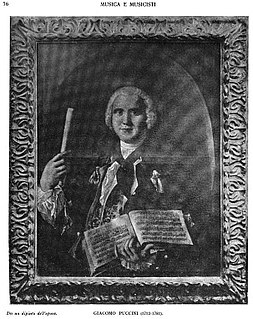
Jacopo (Giacomo) Puccini was an 18th-century Italian composer who lived and worked primarily in Lucca, Tuscany. He was the first of five generations of composers, the most famous of whom was his great-great-grandson, the opera composer Giacomo Puccini.
"O soave fanciulla" is a romantic duet from the first act of Giacomo Puccini's 1896 opera La bohème It is sung as the closing number in act 1 by Rodolfo (tenor) and Mimì (soprano).
Silvano Carroli was an Italian baritone.
References
- ↑ Fairtile (1999) p. 149
- ↑ Boston University Deborah Burton Archived 2011-07-05 at the Wayback Machine
- ↑ Weaver (July 16, 2000) p. 21, Section 2; Sachs (December 10, 2010); Kellow (December 2010)